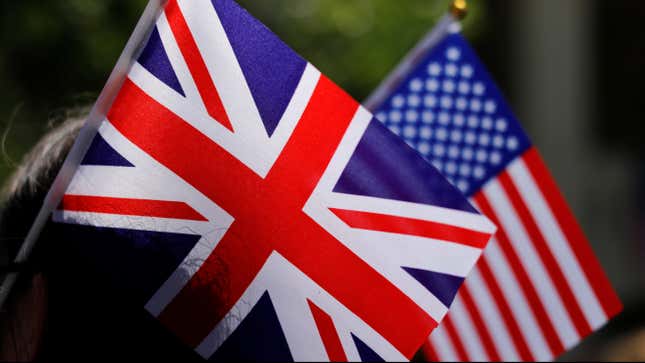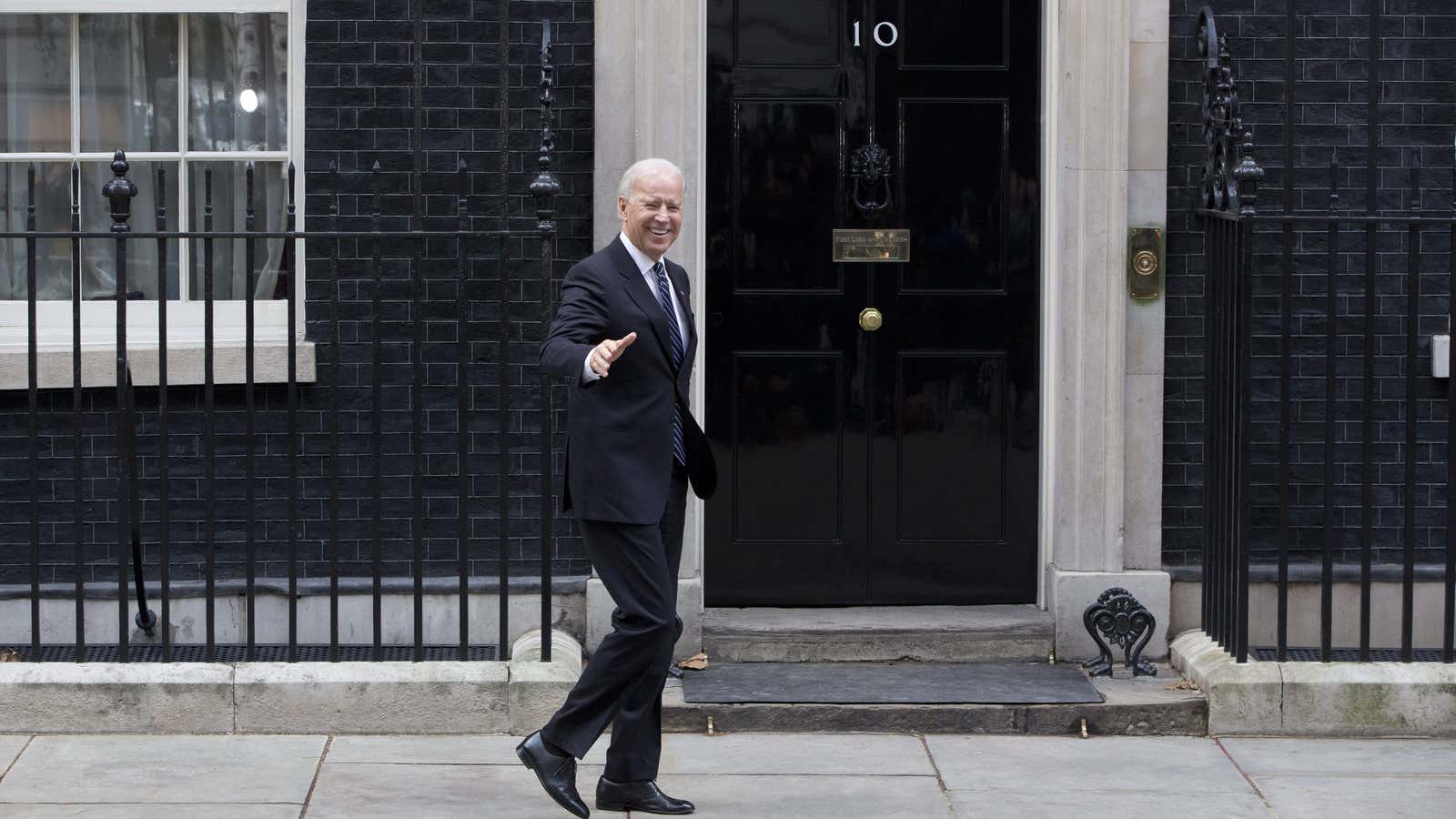Every four or eight years the US elects a new president who holds a different view of the transatlantic relationship than his predecessor—and the countries of Europe have to adjust.
Typically, no matter who is in the White House, London benefits from its “special relationship” with Washington. But UK prime minister Boris Johnson is surely wondering if that will stay true under a president-elect Joe Biden.
The UK-US agenda is packed with important issues to resolve in the coming months. While Biden and Johnson disagree on Brexit, advisers say the two have more in common—from climate change to defense—than the issues that might divide them.
Boris Johnson and the Obama “racism” backlash
According to the Times of London, when it became clear that Biden was likely to win the US presidential election, Johnson joked with aides that Biden “is one of the few world leaders I haven’t insulted.”
That may be true of Biden but it’s not true of his former boss Barack Obama. When Johnson was mayor of London in 2016 he speculated in a column in The Sun that Obama removed a bust of Winston Churchill from the Oval Office because of “the part-Kenyan president’s ancestral dislike of the British empire—of which Churchill had been such a fervent defender.” Washington insiders clearly haven’t forgotten the quip, as evidenced by former Obama national security spokesperson Tommy Vietor:
Meanwhile, in a recent interview with the BBC’s Andrew Marr, US senator Chris Coons (who could become Biden’s secretary of state) said the comment “certainly wasn’t one that was well received on my part”—and presumably, Biden didn’t like it much either.
The president-elect has called Johnson a “physical and emotional clone” of Donald Trump. And while the British prime minister has staked his political career on fulfilling the promise of the Brexit referendum, advisers say vice president Biden supported Obama’s impassioned plea against Brexit in the halls of the Foreign Office in 2016.
But as much as politics can sometimes feel like a preschool playground, personal grudges don’t determine international policy. Johnson was one of the first foreign leaders that Biden called yesterday (Nov. 10), along with Germany’s Angela Merkel, France’s Emmanuel Macron, and Ireland’s Micheal Martin. This shows that “Biden is an Atlanticist,” says Charles Kupchan, the author of Isolationism: A History of America’s Efforts to Shield Itself from the World and a former informal advisor to the Biden campaign on foreign policy. “He believes deeply in teamwork between the US and its traditional European allies.”
As senator, chairman of the Senate foreign relations committee, and later vice president, Biden famously met every UK prime minister since Margaret Thatcher—except for Johnson. As Johnson’s allies like to say, if Biden only met him, and kept an open mind, he’d see that they are not so different.
In his interview with Marr, Coons said Johnson struck him as “more agile, engaging, educated, and forward-looking than perhaps the caricature of him in the American press would have suggested.” He added: “It’s my hope that president-elect Biden will have a similar experience.”
Biden and Brexit
In president Trump, Johnson found a fellow enthusiast of Brexit. And Trump’s assurances that he would fast-track negotiations for a bilateral trade deal appeared to hand Johnson a win ahead of Britain’s official exit from the EU on Dec. 31, 2020. (Johnson has laid out his vision for a “Global Britain” in which, far from retreating from multilateralism, a post-EU Britain engages with the world through preferential bilateral deals and dictates its own bold foreign policy vision.)
But a trade deal never happened. And that’s one of the reasons why Kupchan doesn’t think the UK, “even though Boris Johnson carved out a reasonably chummy relationship with Trump, benefited in any way from ‘America first.'”
Biden’s first focus will be the pandemic and problems at home. “We’re going to have our hands full working through the pandemic…and restoring the vibrancy of our economy,” Coons told Marr. “And a big part of restoring the vibrancy of our economy is making closer the ties between the US and the UK and moving towards a free trade agreement.”
But a trade deal isn’t likely to be “on the front burner in 2021,” argues Kupchan. “I can see it coming back into focus further further down the road.”
A major roadblock when it does will be the question of the UK’s border with Ireland. Some speculate that Biden’s Irish ancestry could sway him to Dublin’s side, but it’s more likely that decades of work in politics infused Biden with a healthy dose of concern about the prospect of a possible “hard border” between Northern Ireland and the Republic of Ireland.
Biden and the “special relationship”
Kupchan views the “special relationship” as a relic of the Cold War. Back then, Washington needed to call up London to know what was happening in Europe because France under De Gaulle was a leading voice against American imperialism and Germany after World War II was still an active theater for US tensions with the Soviet Union.
But “ever since the end of the Cold War, Europe’s center of gravity has shifted eastward,” he argues. “I think what you’ll see is an American diplomacy that tilts more heavily toward France, Germany, perhaps Italy, Spain, [and Poland] because those will be the more influential members of the EU. Washington will continue to reach out to London but…[not] when it comes to shaping EU policy because London will not have a seat at the table on those issues.”

“The question in my mind is really, given that the UK is backing away from its European vocation, will the special relationship lose some of its salience to the US?,” Kupchan asks. “The special relationship will continue, but it perhaps may not be as as consequential as it has in the past.”
There will be plenty of issues on which the UK and the US would benefit from working together that don’t involve Europe or Brexit. Climate change is perhaps the most important because the UK will host the COP26 conference in Glasgow next year. “I think now with president Biden in the White House in Washington, we have the real prospect of American global leadership in tackling climate change,” Johnson told The Associated Press—an implicit dig at Trump, who described global warming as a “hoax.”
A close second on Biden’s priority list for Europe will be figuring out how to deal with China and Russia, two rising powers with contrasting values systems that clash with those of the West in areas like human rights, defense, and technology. “The US and the UK have generally seen eye to eye on Russia and on China,” says Kupchan. “And I think the UK can help out on that front.”
Finally, a newly “Global Britain” can help the US project military strength while Washington focuses more of its resources inward, both Kupchan and Coons have argued. That includes Libya, Nagorno-Karabach, the Persian Gulf, the Horn of Africa, and the eastern Mediterranean, where tensions are high between Turkey and the Europe-backed front of Greece and Cyprus.
But, for all the foreign policy ambitions Biden might have, the reality is that this US presidential election was a close call and at least 72 million people voted for his opponent. “I think that there’s a warning shot there,” says Kupchan. “Our electorates are not universally happy. And that’s why I think that fixing problems at home is such a necessary starting point for repairing the world.”
Correction: An earlier version of this story misattributed the following quote to senator Chris Coons: “The question in my mind is really, given that the UK is backing away from its European vocation, will the special relationship lose some of its salience to the US?” It was said by Charles Kupchan and we regret the error.
